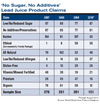
Have consumers drunk their fill? The number of new product introductions in the non-alcoholic beverage category has dried up. New launches of waters, drinks, juices and teas peaked in 2008 and have been falling since then, according to Mintel’s Global New Products Database. In 2008, manufacturers introduced 2,061 new non-alcoholic beverages and 1,293 in 2009. Through the first eight months of this year, the number stood at 845.
Through August, the tea, juice, ready-to-drink iced tea and flavored-water categories (in that order) experienced the largest number of introductions in 2010. Tea and juice products were also one-two in 2006.
The number of new energy drinks led all categories in 2008 with 386; in 2010, the category is in eighth place with 49 introductions.
The sports drinks category, on the other hand, is the only one to show an increase in introductions from 2009 to 2010, growing from 51 to 69.

Claims of purity, eco-friendliness
Chicago-based Mintel also tracked the product attributes that drink manufacturers make about their products. “No-no-no” marketing (“no additives, no sugars, no calories”) is heavily used across the board. But claims have changed somewhat over the last five years, depending on the category.For example, makers of juice products touted “all natural” in 2006. In 2010, juice producers plug “low, no or reduced sugars,” “no additives or preservatives” and “kosher.” “All natural” is now fourth.
Iced-tea processors focus on purity in the promotion of their products, promoting the “all natural,” “no additives or preservatives” and “kosher” attributes of the beverage.
Kosher also is the top attribute in the sports drink category, followed by “no additives or preservatives” and “low, no or reduced calories.”
The Mintel data outlines that more beverage makers are beginning to state claims that have nothing to do with ingredients, taste or nutrition. Claims about environmentally friendly packaging have been on the rise in the last five years. No beverage carried claims of this nature in 2006, but it was a Top 10 attribute in every drink category this year, including waters and flavored waters (not shown in tables).
Besides this green, eco-friendly message, other claims on the rise include gluten-free and low/no/reduced allergens (in the juice category). Perhaps because of the weak economy, juice and iced-tea processors have been backing away from calling their products “premium.”
When the economy improves and shoppers have more income, expect product introductions to increase as beverage makers - and consumers - feel more confident.



